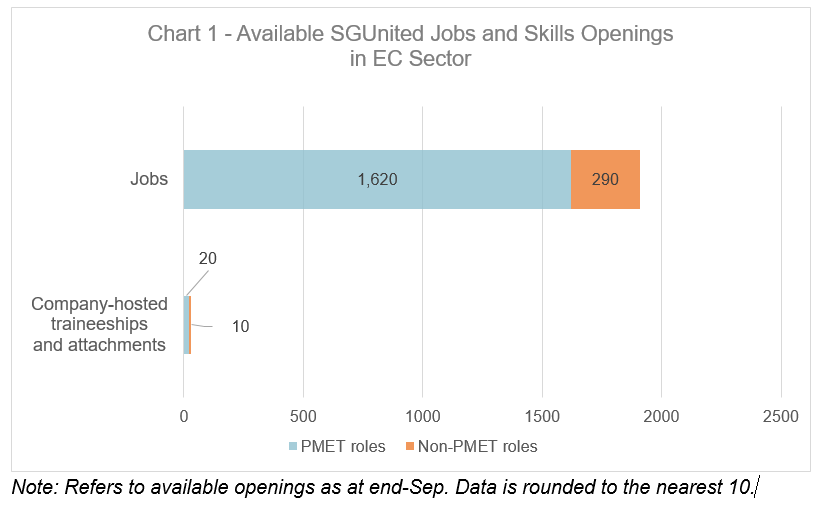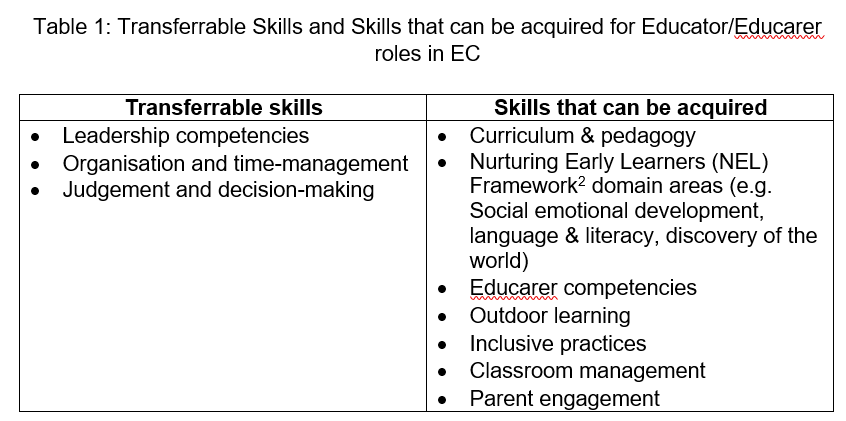Jobs Situation Report 12th Edition (2 Nov)
1. This week’s Jobs Situation Report provides an overview of the job, traineeship, attachment and training opportunities in the Early Childhood (EC) sector, and the support in place for EC operators to adopt progressive HR practices to ensure the well-being of their talents.
Overview of Early Childhood Sector
2. A career in the EC sector can be impactful and deeply fulfilling, as its employees take on the important task of educating children and developing their cognitive, physical and socio-emotional competencies from as young as 18 months. Going beyond education, these talents in the EC sector also partner parents and the community to care for the next generation, ensuring their safety and supporting their growth.
3. With the rise of dual-income families and working grandparents as well as the greater emphasis on the importance of the early years for child development, preschool enrolment is expected to increase, thereby driving the manpower demand of the sector. There are about 21,000 certified educators, up by more than 30% since 2016. The demand is expected to grow as pre-school places are set to increase to more than 200,000 places by 2023.
Progressive HR Practices Early Adopter Programme (Project JOY)
4. To attract and retain talents, the EC sector worked with Workforce Singapore (WSG) to develop and roll out the 12-month Progressive HR Practices Early Adopter Programme (also known as Project JOY). Since November 2016, Project JOY has helped EC operators in better creating a supportive and happy workplace environment, and shaping EC as a sector with attractive career pathways for new entrants as well as existing talents. Having more experienced and trained employees in the sector would also raise the quality of care and education for the next generation.
5. Through the programme, operators can apply for subsidies to undergo training in competencies such as leadership communication, employee engagement, culture building, and HR practices. HR personnel can also attend training programmes to strengthen HR capabilities in areas such as recruitment, retention, learning and development and employee engagement and incentives. They would then be better able to plan and develop training roadmaps to upskill their EC professionals and plug any skills gaps.
a. To date, more than 135 Early Childhood operators, such as Cherie Hearts, Skool4kidz, Learning Vision and Kidz Meadow, have participated in Project JOY, benefiting more than 8,800 employees.
i. This accounts for approximately 30% of the EC workforce.
Effects of COVID-19 on the sector
6. As part of the SGUnited Jobs and Skills efforts, the Early Childhood Development Agency (ECDA) has been working closely with operators to accelerate hiring plans and place affected employees from sectors hard-hit by the pandemic. This includes:
a. Working with operators to provide about 500 short-term Safe Management Assistant (SMA) positions to implement safe management measures in the preschools. The SMAs found to be suitable matches for permanent roles can also be placed on Professional Conversion Programmes (PCPs), where they undergo skills conversion to move into the EC sector.
b. Increase in efforts to reach out and place mid-career jobseekers through the career conversion programmes.
7. The sector has also adjusted quickly to adapt to the changes. EC educators had to innovate and create home-based learning resources. They also had to upskill themselves to leverage on technology to stay connected with their students and parents.
SGUnited Jobs and Skills Openings in the Early Childhood Sector
8. As at end-September, there are over 1,900 available openings in the EC sector, of which 98% are jobs (see Chart 1 below). The majority of available job openings (85%) are in PMET roles such as Pre-school Teachers, Centre Leaders, and Child Care Services Managers.

9. Jobseekers who wish to join the sector as EC educators must attain either a certificate or diploma in early childhood offered by the National Institute of Early Childhood Development (NIEC) or ECDA-accredited programmes conducted by Private Training Agencies. A certified EC course duration range between 4 months and 30 months for mid-career job seekers.
10. Interested mid-career individuals may join the EC sector through the PCP for Preschool Teachers and the Place-and-Train Programme for Educarers to equip these jobseekers with the necessary skills and ECDA-accredited qualifications.
a. Upon successful completion of the programmes, they may register with ECDA as qualified pre-school teachers or certified educarers, and work in ECDA-licensed childcare centres and kindergartens respectively.
11. Table 1 below highlights examples of transferrable skills and skills that can be acquired to enhance career prospects for such roles.

12. Table 2 below outlines the three main tracks under the Skills Framework, jointly developed by ECDA, SSG and WSG, together with early childhood educators, employers, training providers, associations and unions for EC, and the corresponding salary range for educators/educarers in each track.
Table 2: Definition and Salary Range for Educarer, Teacher and Leader Tracks
|
Track
|
Definition
|
Salary Range
|
|
Educarer Track
|
Educators on this track will work with children aged 2 months to 4 years in both kindergartens and childcare centres.
|
$1,800-$3,150
|
|
Teacher Track
|
Educators on this track will work with children aged 4 to 6 years in both kindergartens and childcare centres.
|
$2,200-$3,550
|
|
Leader Track
|
Educators on this track will take on centre or teacher leadership positions in both kindergartens and childcare centres.
|
$3,150-$7,600
|
13. Between April and mid-October 2020, WSG and e2i have facilitated the placement of more than 570 individuals into jobs, and company-hosted traineeships and attachments in the EC sector. This is on top of direct recruitment by operators themselves.
14. Veronica Sung is one of these individuals who joined the sector amid the pandemic.
a. When COVID-19 hit, the 30-year-old former Business Development Manager’s career prospects became uncertain when her former employer, a sustainable packaging company that supplies to the F&B industry, faced a decline in sales along with lower demand from their business partners.
b. Veronica decided to search for a new career pathway that would provide better job security and prospects, and visited career fairs where she chanced upon an opening for an assistant teacher with Safari House.
c. Seeing it as an opportunity to pursue her interest in teaching, Veronica applied and successfully joined the EC operator in Aug 2020.
d. To help equip her with the formal qualifications required of all EC educators, Safari House enrolled Veronica in the PCP for Preschool Teachers.
e. Almost three months into her PCP training, Veronica looks forward to a fulfilling career shaping the lives of Singapore’s next generation. She hopes to emulate the footsteps of those before her who have made similar switches into the sector.
15. Another example is 61-year-old Lam Lai Kheen who made her return to the early childhood education sector in 2017 after having left in the early 90s.
a. The sector had evolved over the years and despite having decades of experience in teaching, Lai Kheen realised that she would need to readjust and adapt to changes. She was also concerned that her age would pose a hurdle.
b. These worries were put to rest when Star Learners hired and enrolled her in the PCP for Preschool Teachers, valuing her passion for teaching and children. The new insights she gained about the industry and the new competencies she picked up during her PCP training eased her re-entry into early childhood and allowed her to continue pursuing her passion.
c. Today, Lai Kheen is still going strong even amid the challenges posed by the pandemic. She has set aspirations for herself to continue as aChinese language educator.
Ancillary Roles in Early Childhood
16. Apart from the more specialised roles that require jobseekers to meet pre-requisites such as having a certificate or diploma in EC, there are also jobs, traineeship and attachment opportunities in ancillary roles that jobseekers can enter, such as in the areas of Marketing, HR, Finance and Administration.
17. Despite being ancillary areas, these roles would still provide jobseekers with a deeper insight into the EC sector, further paving their entry into the sector should they wish to embark on the educator/educarers pathway. These roles also provide both industry-relevant skills and soft skills that can boost their chances of landing a job across other sectors.
For more information
18. To find out more about:
a. Immediate job opportunities in the EC sector under the SGUnited Jobs and Skills Package, please visit www.go.gov.sg/mcfEC.
b. WSG’s programmes and career advisory and matching services, please visit www.mycareersfuture.gov.sg/careercoaching (QR code below) or call WSG’s hotline at 6883 5885.
c. SSG’s Skills and Training Advisory services, jobseekers can visit https://www.myskillsfuture.sg/content/portal/en/career-resources/career-resources/education-career-personal-development/skills-training-advice.html
d. Upcoming engagement and outreach events organised by NTUC’s e2i and WSG, jobseekers can visit https://www.ssg-wsg.gov.sg/events.html or https://e2i.com.sg/events/.